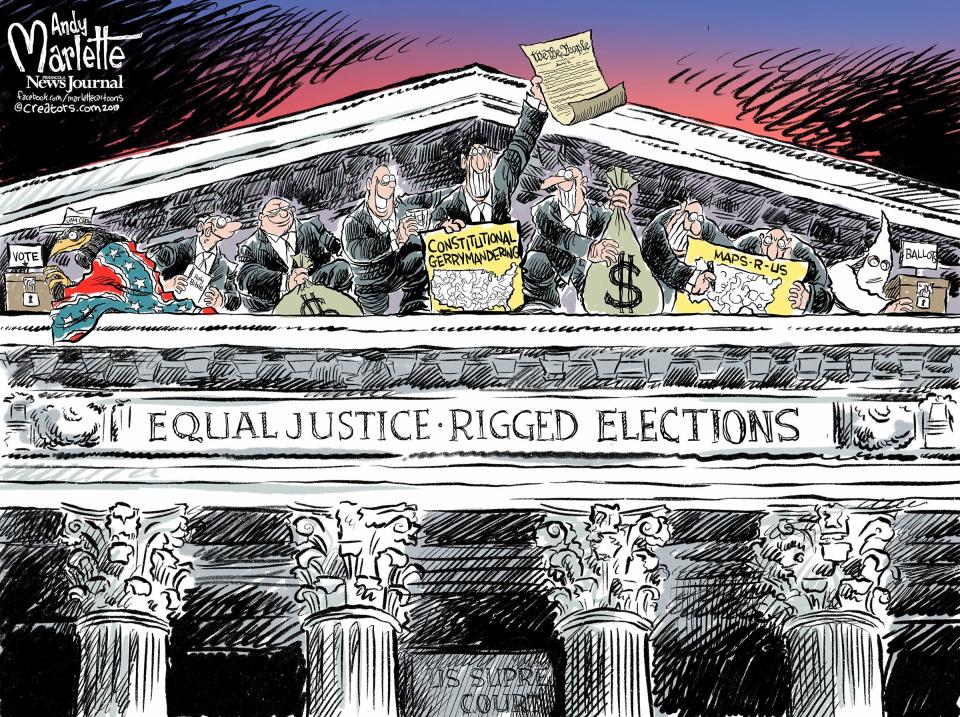Census will mean new ways for politicians to keep power despite earning fewer votes
This is a year of extreme importance, not just because of the national elections but because of the unique power laid in the laps of our nation’s legislators.
It’s the year of the nation’s once-a-decade census, when we gather the data to guide the outlining of congressional and legislative districts and elect the legislators who next year will draw the maps reflecting population shifts. In most states — but not Iowa — that creates a field day for gerrymandering, which enables the party in power to come up with maps that can all but guarantee their retention of that power.
Since 1980, Iowa’s redistricting has been done by a non-partisan legislative commission. Its efforts are sometimes modified in the Legislature, but it remains a workable plan other states should emulate. The states of Colorado, Missouri, Michigan, Ohio and Utah are working on it.
Iran finally went too far: Donald Trump showed restraint, then resolve, in killing of Iran's Qassem Soleimani
Elsewhere, gerrymandering and voter suppression have made political victors out of losers with increasing frequency. Every year that passes without abolishing this underhanded chicanery means it is less likely that fair voting will ever prevail nationwide. And Iowans suffer, along with the rest of the nation.
Congress create the laws, but states create the Congress
Congress creates the nation’s laws, but the nation’s states create congressional district borders. By law, those districts must have approximately equal populations, as must legislative districts. But their borders can be drawn to give advantages to the politics of the map-makers, who put as many opponents as possible in as few districts as possible, conceding those districts in elections. That enables them to give slight majorities to their political friends in a majority of districts. Their parties win dozens of races by slight majorities; their enemies win a couple of seats, by huge majorities.
The same methods can distort the makeups of the legislatures whose members direct the mapping, all but guaranteeing that the party in power will remain in power, regardless of what the majority of voters want. Other efforts to foul honest voting include reducing the number of polling places to the degree that some voters must wait as long as five hours, and imposing senseless identification requirements.
In the national election of 2012, Democrats running for the U.S. House won 1,370,000 more votes than Republicans. But thanks to the gerrymandering map-makers, Republicans won the House — with a 33-member majority.

Just 14 months ago, Republicans in North Carolina won 51% of the votes for the state’s U.S. House seats, but secured 10 seats to the Democrats’ three. In Ohio, Republicans won 52%, and snared 12 seats to the Democrats’ four. In Wisconsin, Republicans won just 46% of the votes — but that got them eight seats to the Democrats’ five.
The 2018 House vote was called a “blue wave,” with Democrats gaining a 41-vote majority. But an analysis by the Associated Press indicated that an honest count —meaning without gerrymandering — would have pushed that to 57.
The U.S. Supreme Court was asked in 2018 to outlaw political gerrymandering. The court called it a political matter in which courts have no role. In effect, five justices ruled that the voting laws that govern us can be steadily distorted, increasingly benefiting false majorities and steadily lessening the possibility that honesty can be restored.
The matter’s urgency could not be greater; ultimately it affects every issue before the nation today and far into the future. If we play the game of politics by rules set by just one party, the party’s over.
Bill Leonard is a retired editorial writer for the Des Moines Register, where this column originally appeared.
You can read diverse opinions from our Board of Contributors and other writers on the Opinion front page, on Twitter @usatodayopinion and in our daily Opinion newsletter. To respond to a column, submit a comment to letters@usatoday.com.
This article originally appeared on Des Moines Register: 2020 Census, gerrymandering make elections even more important

